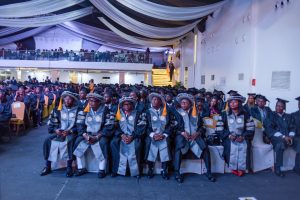Nigeria’s digital economy is undergoing a revolutionary transformation, driven by the rapid adoption of digital technologies, artificial intelligence (AI), and government-backed initiatives aimed at fostering innovation. However, despite significant progress, challenges such as inadequate infrastructure, digital literacy gaps, and regulatory roadblocks continue to pose hurdles.
A new report by Rome Business School, a leading international business education institution, takes a deep dive into this evolving landscape, analyzing how digitalization is reshaping industries like finance, telecommunications, agriculture, and education. It also outlines critical obstacles that must be overcome to unlock Nigeria’s full digital potential.
According to Asunmo Olakunle, General Manager of Rome Business School Nigeria, digitalization is no longer a choice but a necessity for economic growth. “We are witnessing impressive transformations across key sectors. However, to fully capitalize on these opportunities, Nigeria must improve its digital infrastructure, bridge the skills gap, and establish clear regulatory frameworks,” he stated.
The report highlights how AI, blockchain, and cloud computing are becoming indispensable tools for businesses. In the financial sector, AI-driven solutions are now widely used for fraud detection, credit scoring, and customer service automation, with 32% of financial institutions leveraging these innovations to streamline operations and enhance security. Similarly, the agricultural sector is seeing a shift with the adoption of IoT solutions and mobile applications that enable farmers to monitor crop health, access larger markets, and reduce reliance on middlemen.
Professor Antonio Ragusa, Founder and Dean of Rome Business School, commended the private sector’s role in accelerating digital growth. “From fintech to agritech and e-commerce, businesses are leveraging AI and digital solutions to enhance efficiency, improve service delivery, and create new economic opportunities,” he said.
Despite these advancements, Nigeria’s digital transformation is not without obstacles. Infrastructure deficits, including inconsistent power supply and unreliable internet connectivity, continue to hinder widespread adoption, particularly in rural areas. Many businesses and individuals struggle with the affordability of digital tools, limiting their ability to embrace new technologies. Furthermore, concerns about data privacy, ethical AI usage, and regulatory uncertainty remain key areas that require urgent attention.
The government has been proactive in advancing digitalisation through initiatives like the National Digital Economy Policy and Strategy (2020–2030) and the 3MTT (Three Million Technical Talent) program, which aims to train three million technology professionals by 2030. These efforts are crucial for bridging the digital skills gap and preparing Nigeria’s workforce for the future.
With over 150 million internet users, Nigeria is poised to emerge as a leading digital economy in Africa. However, achieving this vision will require a coordinated effort between the government, private sector, and academia to invest in digital infrastructure, capacity-building programs, and well-defined regulations.
To further contribute to this effort, Rome Business School will release a series of industry-specific reports covering finance, agriculture, healthcare, and manufacturing. These reports will offer actionable insights for businesses, policymakers, and investors seeking to navigate Nigeria’s digital economy.
Beyond research, the institution is actively engaged in training programs, workshops, and professional certifications designed to equip individuals and businesses with the knowledge and skills necessary to thrive in the digital age.
“Our goal is not just to analyze trends but to empower Nigerian businesses and individuals with the knowledge and tools they need to succeed,” Olakunle concluded.
The full report is available on Rome Business School’s official website, offering valuable insights for industry leaders, entrepreneurs, and policymakers shaping Nigeria’s digital future.
Despite these advancements, Nigeria’s digital transformation is not without obstacles. Infrastructure deficits, including inconsistent power supply and unreliable internet connectivity, continue to hinder widespread adoption, particularly in rural areas. Many businesses and individuals struggle with the affordability of digital tools, limiting their ability to embrace new technologies. Furthermore, concerns about data privacy, ethical AI usage, and regulatory uncertainty remain key areas that require urgent attention.




